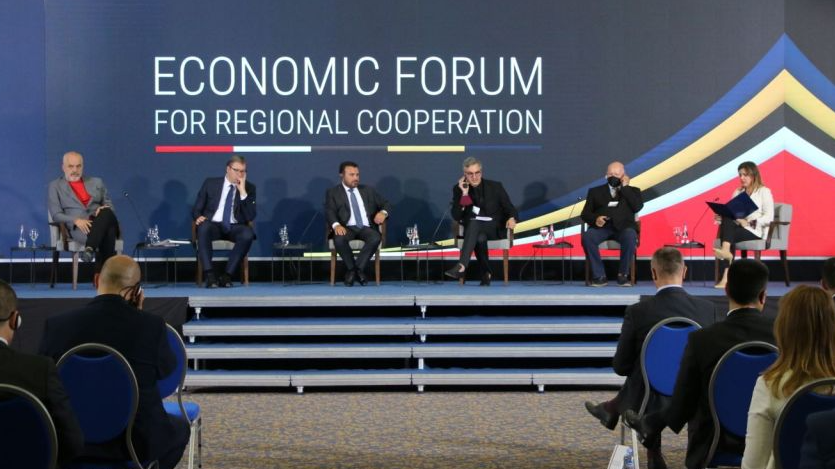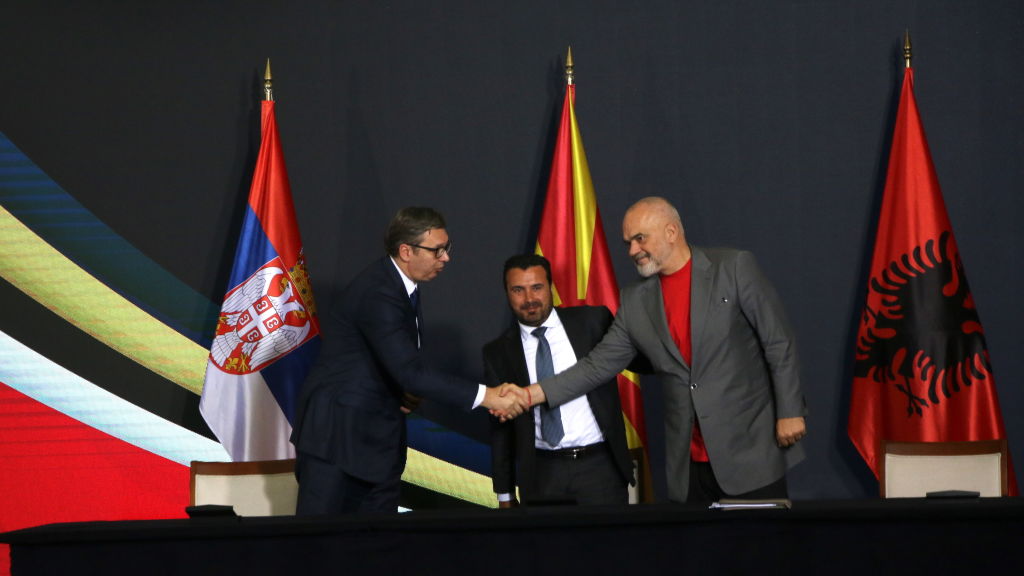
Serbian President Aleksandar Vucic (2nd L), Prime Minister of North Macedonia Zoran Zaev (3rd L) and Albanian Prime Minister Edi Rama (L) attend the Skopje Economic Forum for Regional Cooperation in Skopje, North Macedonia, July 29, 2021./Getty
Serbian President Aleksandar Vucic (2nd L), Prime Minister of North Macedonia Zoran Zaev (3rd L) and Albanian Prime Minister Edi Rama (L) attend the Skopje Economic Forum for Regional Cooperation in Skopje, North Macedonia, July 29, 2021./Getty
Editor's note: Nikola Mikovic is a freelance journalist based in Serbia. He covers mostly Russian, Ukrainian and Belarusian foreign policies, and writes for multiple web magazines. The article reflects the author's opinions, and not necessarily the views of CGTN.
Aware that their countries will not join the European Union any time soon, leaders of Serbia, North Macedonia and Albania started their own economic integration process. On July 29, in North Macedonian capital Skopje, Serbian President Aleksandar Vucic and prime ministers of North Macedonia and Albania, Zoran Zaev and Edi Rama, agreed to abolish border controls between the three Balkan states from January 1, 2023, and also to deepen economic ties.
Such actions are part of Mini Schengen, the initiative for regional cooperation named after the EU's passport and duty-free zone, which has now been rebranded to Open Balkan. In 2019, in Novi Sad, Serbia, the Serbian president, and the prime ministers of Albania and North Macedonia agreed to create an economic zone, which would further improve political and economic relations and strengthen cultural ties between the nations.
Richard Grenell, then U.S. President Donald Trump's special envoy to the Balkans, strongly backed the initiative as a way to jump-start the free movement of people and commerce. After the Skopje summit, European Commission Spokeswoman Ana Pisonero also supported the leaders' commitment to regional co-operation.
Officially, the three Balkan countries are the EU candidates, but given the EU enlargement process has stalled, Brussels and Washington seem to try to find a way to preserve their political influence over the Balkan nations that are still out of the EU. From a Western perspective, the Open Balkan initiative will provide the region an alternative to the EU membership. In the mid-term, other countries, primarily Bosnia and Herzegovina and Montenegro, could join the Balkan trio, unless they get firm guarantees from Brussels that they are next to join the European Union, which does not seem very probable, especially for Bosnia and Herzegovina. Montenegro, on the other hand, is seen as the 28th EU member state, but certainly not before 2025.

Serbian President Aleksandar Vucic, Prime Minister of North Macedonia Zoran Zaev and Prime Minister of Albania Edi Rama sign agreements that will facilitate the lives of the citizens of the region within the Skopje Economic Forum for Regional Cooperation in Skopje, North Macedonia, July 29, 2021. /Getty
Serbian President Aleksandar Vucic, Prime Minister of North Macedonia Zoran Zaev and Prime Minister of Albania Edi Rama sign agreements that will facilitate the lives of the citizens of the region within the Skopje Economic Forum for Regional Cooperation in Skopje, North Macedonia, July 29, 2021. /Getty
Meanwhile, the two nations, as well as Kosovo – which is the subject of a long-running political and territorial dispute between the Serbian government and the authorities in Pristina – will likely be pressured to integrate into Open Balkan. Their economies are already heavily linked with Serbian, North Macedonian and Albanian, and in the foreseeable future, according to the agreements signed between Vucic, Zaev and Rama, the same rules in exports, imports of goods and free access to labor will apply to the three founding nations of the Open Balkan initiative.
In other words, people living in North Macedonia and Albania will be able to apply for jobs in Serbia under the same conditions as the Serbian citizens. In order not to remain "isolated", business communities in Bosnia and Herzegovina, Montenegro and Kosovo are expected to demand from their authorities to join the Open Balkan initiative.
Formally, all countries in the region will remain "on the European path", which means that they will be in the EU waiting room, and will politically and economically depend on the West.
However, the Open Balkan initiative gives them an option to strengthen their economic ties, as well as the freedom of movement, and also to create some sort of mini EU in the Balkans. Given that many successful companies in the Balkan states that are out of the EU are owned by foreign, mainly EU corporations, it is not surprising that the EU leaders support the Open Balkan project.
From the purely economic perspective, the new form of regional cooperation could have a positive income on Serbia, North Macedonia and Albania – and potentially on other Balkan countries should they eventually join the initiative – although the three countries, as well as the whole region in general, will remain at odds.
Divided and quarreled, the Serbs and Albanians, as the two dominant ethnic groups in Open Balkan, will unlikely reconcile the same way the German and French did after the Second World War. Franco-German reconciliation eventually led to the creation of the EU. The problem in the Balkans is that certain foreign actors still play the divide and rule game, which makes the reconciliation process in the region very difficult.
There is, however, hope that relations between the Balkan nations will gradually improve. Until recently, it was almost unthinkable for the Serbs to spend their summer vacations in Albania. This year, a growing number of Serbian tourists could be seen on the Albanian Adriatic and Ionian beaches. In addition, many Serbs from the country's rural areas cross ethnic divide and travel to Albania to find brides.
That, however, does not mean that Serbia and Albania will try to implement a policy of "brotherhood and unity" – which was a popular slogan of the League of Communists of Yugoslavia. Instead, at least for the time being, Belgrade and Tirana will likely push for a more pragmatic approach in their relations, focusing primarily on economic issues.
Finally, although the Open Balkan initiative is seen as a result of frustration with the lack of tangible progress towards EU membership, it could eventually completely change the region, for better or for worse.
(If you want to contribute and have specific expertise, please contact us at opinions@cgtn.com.)

